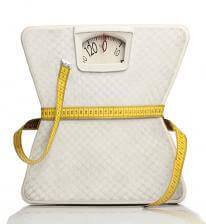How Long Does It Take for Food to Turn to Body Fat?
If you over-indulge today, when will it show up on the scale? Maybe never. Read on to learn how and when food turns to fat on your body.
Monica Reinagel, MS, LD/N, CNS

Answer. That’s not really how it works! Most of the day-to-day change that you see on the scale doesn’t reflect changes in body fat but is due instead to temporary fluctuations in water and/or waste.
See also: Weight Fluctuation: How Much is Normal?
Besides, a single cheeseburger is no more likely to be “converted to fat” than a single chicken caeser salad.
If you regularly over-indulge, excess calories will be stored as fat. Eventually, this will add up to measurable weight gain. This is true of any type of food – even “healthy” food. But it’s especially true of foods that are high in sugars, refined carbohydrates, trans fats, and other empty calories. These foods not only pack a lot of calories but they also affect metabolism and appetite in ways that can promote weight gain.
But, under normal circumstances (i.e., not a reality television show), you’d have to overeat for several weeks to gain a significant amount of actual body fat. (Which is why you also have to restrain your intake for several weeks to lose a significant amount of body fat.)
Here’s the bottom line: If you are eating well almost every day, a single indulgence is unlikely to have any significant impact on your body fat percentage.
As I’ve said before, it’s not your best day or your worst day but how you eat most days that determines your overall health.
See also: Biggest Nutrition Traps, Part 3: Mean v. Extreme
Weight loss scale image courtesy of Shutterstock.

